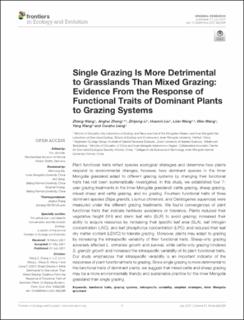Please use this identifier to cite or link to this item:
https://doi.org/10.21256/zhaw-22804Full metadata record
| DC Field | Value | Language |
|---|---|---|
| dc.contributor.author | Wang, Zheng | - |
| dc.contributor.author | Zhang, Jing Hui | - |
| dc.contributor.author | Li, Zhiyong | - |
| dc.contributor.author | Liu, Huamin | - |
| dc.contributor.author | Wang, Lixin | - |
| dc.contributor.author | Wang, Wen | - |
| dc.contributor.author | Wang, Yang | - |
| dc.contributor.author | Liang, Cunzhu | - |
| dc.date.accessioned | 2021-07-16T07:03:17Z | - |
| dc.date.available | 2021-07-16T07:03:17Z | - |
| dc.date.issued | 2021-07-01 | - |
| dc.identifier.issn | 2296-701X | de_CH |
| dc.identifier.uri | https://digitalcollection.zhaw.ch/handle/11475/22804 | - |
| dc.description.abstract | Plant functional traits reflect species ecological strategies and determine how plants respond to environmental changes, Plant functional traits reflect species ecological strategies and determine how plants respond to environmental changes, however, how dominant species in the Inner Mongolia grassland adapt to different grazing systems by changing their functional traits has not been systematically investigated. In this study, we established four 7-year grazing treatments in the Inner Mongolia grassland: cattle grazing, sheep grazing, mixed sheep and cattle grazing, and no grazing. Fourteen functional traits of three dominant species (Stipa grandis, Leymus chinensis, and Cleistogenes squarrosa) were measured under the different grazing treatments. We found convergences of plant functional traits that indicate herbivory avoidance or tolerance. Plants reduced their vegetative height (VH) and stem: leaf ratio (SLR) to avoid grazing; increased their ability to acquire resources by increasing their specific leaf area (SLA), leaf nitrogen concentration (LNC), and leaf phosphorus concentration (LPC); and reduced their leaf dry matter content (LDMC) to tolerate grazing. Moreover, plants may adapt to grazing by increasing the intraspecific variability of their functional traits. Sheep-only grazing adversely affected L. chinensis growth and survival, while cattle-only grazing hindered S. grandis growth and increased the intraspecific variability of its plant functional traits. Our study emphasizes that intraspecific variability is an important indicator of the responses of plant functional traits to grazing. Since single grazing is more detrimental to the functional traits of dominant plants, we suggest that mixed cattle and sheep grazing may be a more environmentally friendly and sustainable practice for the Inner Mongolia grassland than single grazing. | de_CH |
| dc.language.iso | en | de_CH |
| dc.publisher | Frontiers Research Foundation | de_CH |
| dc.relation.ispartof | Frontiers in Ecology and Evolution | de_CH |
| dc.rights | http://creativecommons.org/licenses/by/4.0/ | de_CH |
| dc.subject | Functional trait | de_CH |
| dc.subject | Grazing system | de_CH |
| dc.subject | Intraspecific variability | de_CH |
| dc.subject | Adaption strategy | de_CH |
| dc.subject | Inner Mongolia grassland | de_CH |
| dc.subject.ddc | 577: Ökologie | de_CH |
| dc.title | Single grazing is more detrimental to grasslands than mixed grazing : evidence from the response of functional traits of dominant plants to grazing systems | de_CH |
| dc.type | Beitrag in wissenschaftlicher Zeitschrift | de_CH |
| dcterms.type | Text | de_CH |
| zhaw.departement | Life Sciences und Facility Management | de_CH |
| zhaw.organisationalunit | Institut für Umwelt und Natürliche Ressourcen (IUNR) | de_CH |
| dc.identifier.doi | 10.3389/fevo.2021.682289 | de_CH |
| dc.identifier.doi | 10.21256/zhaw-22804 | - |
| zhaw.funding.eu | No | de_CH |
| zhaw.issue | 682289 | de_CH |
| zhaw.originated.zhaw | Yes | de_CH |
| zhaw.publication.status | publishedVersion | de_CH |
| zhaw.volume | 9 | de_CH |
| zhaw.publication.review | Peer review (Publikation) | de_CH |
| zhaw.webfeed | Vegetationsökologie | de_CH |
| zhaw.author.additional | No | de_CH |
| zhaw.display.portrait | Yes | de_CH |
| Appears in collections: | Publikationen Life Sciences und Facility Management | |
Files in This Item:
| File | Description | Size | Format | |
|---|---|---|---|---|
| 2021_Wang-etal_Grassland-grazing-systems.pdf | 2.39 MB | Adobe PDF |  View/Open |
Show simple item record
Wang, Z., Zhang, J. H., Li, Z., Liu, H., Wang, L., Wang, W., Wang, Y., & Liang, C. (2021). Single grazing is more detrimental to grasslands than mixed grazing : evidence from the response of functional traits of dominant plants to grazing systems. Frontiers in Ecology and Evolution, 9(682289). https://doi.org/10.3389/fevo.2021.682289
Wang, Z. et al. (2021) ‘Single grazing is more detrimental to grasslands than mixed grazing : evidence from the response of functional traits of dominant plants to grazing systems’, Frontiers in Ecology and Evolution, 9(682289). Available at: https://doi.org/10.3389/fevo.2021.682289.
Z. Wang et al., “Single grazing is more detrimental to grasslands than mixed grazing : evidence from the response of functional traits of dominant plants to grazing systems,” Frontiers in Ecology and Evolution, vol. 9, no. 682289, Jul. 2021, doi: 10.3389/fevo.2021.682289.
WANG, Zheng, Jing Hui ZHANG, Zhiyong LI, Huamin LIU, Lixin WANG, Wen WANG, Yang WANG und Cunzhu LIANG, 2021. Single grazing is more detrimental to grasslands than mixed grazing : evidence from the response of functional traits of dominant plants to grazing systems. Frontiers in Ecology and Evolution. 1 Juli 2021. Bd. 9, Nr. 682289. DOI 10.3389/fevo.2021.682289
Wang, Zheng, Jing Hui Zhang, Zhiyong Li, Huamin Liu, Lixin Wang, Wen Wang, Yang Wang, and Cunzhu Liang. 2021. “Single Grazing Is More Detrimental to Grasslands than Mixed Grazing : Evidence from the Response of Functional Traits of Dominant Plants to Grazing Systems.” Frontiers in Ecology and Evolution 9 (682289). https://doi.org/10.3389/fevo.2021.682289.
Wang, Zheng, et al. “Single Grazing Is More Detrimental to Grasslands than Mixed Grazing : Evidence from the Response of Functional Traits of Dominant Plants to Grazing Systems.” Frontiers in Ecology and Evolution, vol. 9, no. 682289, July 2021, https://doi.org/10.3389/fevo.2021.682289.
Items in DSpace are protected by copyright, with all rights reserved, unless otherwise indicated.